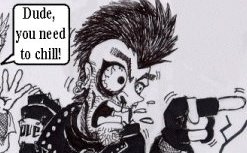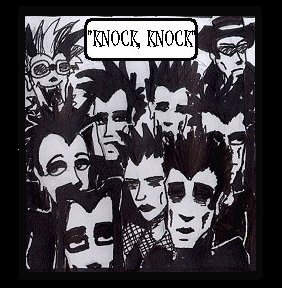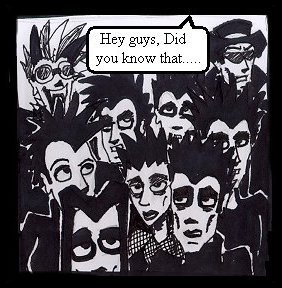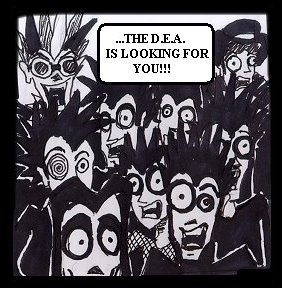The Crystal Myth:


Author’s Note: All names in this article have been changed, and many of those described are composites of multiple people from reality. If you’re wondering if you are depicted in this article, contact the author and she will let you know.
A few months after I moved down to Washington, DC, my mother came down to visit and commented approvingly on how thin my old friend Leah was. When I explained that she’d become so slender because she’d been using crystal meth, my mother responded, “Well, she looks great. Why aren’t you doing it?”
I often asked myself that same question. My friends who were on meth were all slim and full of energy. They had no problem attracting romantic or sexual partners, and had all sorts of built-in friends that seemed to come with the drug. Most of them lived in the same apartment complex, which seemed to be the center of the Goth scene in town — if you didn’t live there, you spent all your time hanging out there. At the time I had a terrible fear of sleep, and meth would take care of that, too, since it would keep me awake for days.
Something, however, kept me away from it. Maybe it was the screams of pain my friends would let out as they snorted it, describing it as feeling like a hot icepick in their eye. Maybe it was the way they’d sleep for 24 hours or more when they came down, missing work or appointments. Maybe it was the nasty fights I’d see them getting into, irrationally angry for no good reason.
Whatever it was, even with all the offers of free drugs, and the encouragement from my mother (who still thinks that all one’s problems will be solved if only one is thin), I never tried it. Frequently, I regretted it.
Leah had been great about showing me around the scene. She had lots of friends and was always there when anyone needed a hand. She was great about providing me a shoulder to cry on when I needed it, and was someone I looked up to as a strong, independent woman. Even though she was doing meth, she never pushed me to try it. She’d offer if she was doing it, but she wouldn’t ever push; it was just a matter of being a polite host. Besides, she’d share anything; she was the sort of person who’d give you the shirt off her back.
Leah had always had problems staying thin. She’d been working as a topless dancer (it paid better money than temping), but her boss had threatened to fire her because of her weight gain. She started doing meth and immediately dropped the weight, plus had the energy to clean her entire house after a long night dancing.
It gave her the energy to throw events that large numbers of people on the Goth scene came to — fascinating people that she was always nice enough to introduce me to. Most of the people who were there were doing meth together. It’s a very social drug, and Leah told me it can be very warm and bonding. Everyone who did it seemed to have almost a wartime cameraderie.
She’d always been social and friendly, but meth put her into overdrive, making her even more chatty and outgoing. Everyone else she hung around with was very social, too — it’s a side effect of the drug. In addition, they all had rapier wits. Later, remembering one particular night, Leah pointed out the downside of the chattiness. In a room with seven people on meth, there were seven different conversations going on. “Everyone was talking to the air,” she said.
Her friend Andi started doing meth around the same time. Shortly after she started, her boss complimented her on how productive she had become, and how much more accurate her transcription of the Congressional logs were. Suddenly she had the energy to stay out all night dancing and show up at work at 8am. Her bulimia also began to taper off — when you don’t eat there’s nothing in your stomach to vomit.
That was the honeymoon period, about the time that I showed up in town. I found myself surrounded by energetic, thin, witty people and did my darndest to keep up. I couldn’t — I kept falling asleep while everyone else was still having fun. What I didn’t realize was that each of them was dreading being the last one awake. Leah has said that if she were to ever write a book about the period, it would be titled “Please Don’t Go To Sleep”. The worst feeling in the world, she said, was to be lying awake staring at the ceiling when everyone else around you was asleep.
 By this time, nearly everyone I knew had moved into the same apartment complex to be near each other, and their dealers. I thought about moving in so I didn’t have such a long commute to my bed, and started tossing around the idea of trying meth just to have as much fun as everyone else was when suddenly, everyone just started to get mean.
By this time, nearly everyone I knew had moved into the same apartment complex to be near each other, and their dealers. I thought about moving in so I didn’t have such a long commute to my bed, and started tossing around the idea of trying meth just to have as much fun as everyone else was when suddenly, everyone just started to get mean.
When Leah’s boyfriend Drew would throw things at the walls in a rage, I just shrugged it off as his traditional out-of bounds behavior. He was in the military anyway — honor guard at Arlington National Cemetery — and I figured that showed a natural propensity for violence. I also saw Leah snap at people for no real reason a few times, but knew that she’d always been a little volatile emotionally. That was just the precursor, however, for things getting much worse.
Fights became a fairly common thing, both at the club and at parties, screaming arguments over trivialities. People would be forced to choose sides, and suddenly things became factionalized — you could go to Tracks but not Roxy, because “they” might be at Roxy.
If people weren’t argumentative during the crash, they were caught up in utter despair. Leah and Andi would spend late nights sitting around the living room in complete misery, and nothing I could say could bring them out of it. The only thing that did alleviate it somewhat was pot. “I do meth to take the edge of the pain off of life,” they would say. “I smoke pot to take the edge of the pain off of meth.”
Leah would call up demanding my presence at the oddest hours of day and night — she suddenly couldn’t bear to be alone. However, when I needed her, she didn’t really have time for me; she was always busy with other things, or pointing out how much more important her problems were than mine. She’d also frequently shoo me out of the house when she was going to have certain guests over — to this day, I’m not sure whether it was because she didn’t think I was cool enough for them, or because she was embarrased to have me see some of the people she was hanging around with.
I’d look up Andi, but she was disappearing for hours on end. Later we learned she’d been buying from several sources, so no one would know how much crank she was doing. She even hid how much she was doing from her husband Jimmy.
Andi and Jimmy had never had the smoothest marriage, but now they were fighting a lot. One of the big issues was the lack of sex — she wanted it, but he wasn’t putting out. When they’d first started doing the drug, they both bragged about how he could fuck for hours. They’d had to buy a lot of lubricant — meth dehydrates people a lot, and though Andi was turned on, she couldn’t stay wet for very long. The lubricant had been sitting unused on the shelf for a while, though; Jimmy’d been unable to perform. After a few months of meth use, men’s prostates frequently get enlarged, and Jimmy was no exception. Enlarged prostate = no hard-on = no sex.
Leah and Drew had broken up, after one screaming fight too many during the meth crash. She kept doing more meth, to try and cheer herself up. She’d started getting sores on her body from malnutrition; she put makeup on them to cover them up while she was dancing, but it irritated them, and her compulsive scratching made the marks worse.
Now she was unattractively skinny, and between that and her nasty attitude toward the men she danced for, she was earning less and less in tips. She couldn’t make ends meet anymore, and had started selling her books, TV, records, and everything else to get more cash to buy more meth, and stealing beer from the local 7-11 so she could have something to drink that would take the edge off. She’d borrow money from me (and be extra-nice to me when I was visiting and she needed it), but I’d never get the money back. Her downstairs neighbors, Nate and Shaun, had run an extension cord up to her place to get the power to run their appliances; their utilities had been turned off for non-payment.
Then things got worse. Rosie, the local dealer, had her apartment broken into and all her drugs stolen. Drew said he’d seen someone breaking into her apartment. Oddly enough, Drew also no longer needed to buy any meth. Some people thought he’d stolen it, other people thought he was innocent, and more battle lines were drawn. In addition, several residents were being served with eviction papers for non-payment of rent.
  
|
Some time around then, Leah also blew up at me. I didn’t know what I’d done, but she was angry, and determined I was persona non grata. She spread the word, and a whole bunch of those good friends I’d made through her wouldn’t speak to me. I suddenly found that the core of my friends, and my central hang-out point, was taken away from me.
Because I was so distanced from everyone, I missed the downfall of one of the most brilliant guys I’d ever met. Michael was a very smart guy; he ran a role-playing game which still lives in legend among anyone who was ever involved in it. He was well educated, an avid reader, and could discuss any topic anyone would care to bring up intelligently and at length. He had a pretty good job and was living with his parents, which had allowed him to save enough money to buy a really nice van.
After he started doing meth, that quickly changed. Out of everyone I knew, he went through the most full-fledged personality shift. Where he used to enjoy discussing any topic, the only topic he now wanted to discuss was drugs. He was fired from his job, his parents kicked him out of his house, and he lost his van. No, it wasn’t taken from him — he went on such an intense meth binge that he forgot he owned it, and by the time he was reminded he couldn’t remember where he’d parked it. It wasn’t recovered.
I also missed what Leah calls “the worst night ever”. A lot of the crew went to a local science fiction convention together, and most of them spent the entire time on a meth binge. Michael had actually been doing it for about a week, if not more. He had a large cigar box about a quarter of the way full of crystal — easily $10,000 worth — and gave it out to whoever wanted it.
By day three, everyone was very much on edge. They were hanging around in someone else’s room when there was a knock on the door. A girl who’d taken a few bumps from Michael told them that the DEA was looking for him. It later turned out that she’d squealed to the DEA, and then felt bad about it. I’ve heard that some people talked about killing her for that, but I don’t think anything ever happened.
Leah told me that this scared the hell out of everyone. A few people were crying, and everyone was sure that they would go to jail for life. They couldn’t ask Michael what he wanted to do — he had fallen unconscious. Even violent shaking wouldn’t wake him up, and his breathing was irregular. One of the girls wanted to bring him to the hospital, but the rest of them were afraid they’d go to jail if they did.
They found someone they barely knew to take Michael back to his house (across state lines — a felony offense, though the driver didn’t know it). “We flushed the drugs down the toilet and we ran,” said Leah. Michael eventually recovered. But to Leah, this distressing experience was something of a wakeup call.
While all this was going on, I started hanging out with other people who’d previously been on the periphery of my attention. They made up a different segment of the scene, one that wasn’t doing any speed, and one which I hadn’t really been familiar with before. They weren’t exactly straightedge, but they didn’t do meth, and they lacked the extreme emotional volatility that I had thought was central to most Goths’ tempraments. They also got a normal amount of sleep and food, and the more human lifestyle allowed me to finally shake that nagging cold I’d had for months.
The number of people coming out to clubs started to diminish — they didn’t have the money, or they were sleeping off their latest meth jag, or they were at war with someone else who they thought was going to be there, who in turn didn’t show up for similar reasons. The money coming to the clubs started to drop, and nights started closing.
I heard Leah’d left her job dancing, and that Rosie had literally vanished in the middle of the night, leaving behind a filthy apartment with a broken toilet that had continued to be used well after it was broken, some furniture and a whole lot of syringes. I also heard that Drew had been thrown out of the military with a dishonorable discharge, a huge comedown for someone who had once had a very respected position.
Rosie’s disappearance led another major dealer to stop selling, and a lot of people decided to back away from the drug, including Leah. She immediately started gaining weight. I saw her a few months later at Tracks, and found that for the first time in our lives she actually weighed more than I did. Unlike me, however, she looks absolutely gorgeous at that weight too — a fact which I never fail to mention to my mother. She’d regained her caring good nature as well, and was more the friend I remembered and loved than the insecure, irritable woman who’d taken her place.
She wasn’t the only one who gained weight. Drew had put on enough weight to be nearly unrecognizable, and Shaun had also ballooned. Meth had given them the figures that are normally only seen in magazines, but the metabolism meddling proved irreparable. Leah’s still always cold, and frequently feels tired, and those aren’t uncommon complaints among the former chronic users I know.
Leah also spent a lot of her time crying, and had a great deal of trouble getting out of bed in the morning — and frequently, at any time of the day. She finally went to a psychiatrist, who diagnosed her with depression and put her on Prozac. Later we read that chronic meth use permanently alters serotonin levels in the brain, and realized that was probably where her problem began.
For a while, things seemed to die down. Then about a year later, about the time I started DJing, things changed. For a while we had crowds in the club. With some frequency, clubgoers would get into screaming fights, and occasional fistfights. I just passed it off to the whole “most goths are emotionally unstable” theory and did my best to keep everyone happy — but the psychodrama and the status games seemed to be on a very large upswing. I kept a bit distant from all but my closest friends, just because I wanted to stay out of the melodrama. This distance, plus a certain amount of ostrich behavior on my part, kept me from noticing that a new round of heavy meth use was hitting the scene among the younger crowd. While the older people had managed to get their lives together, and the bulk of them had gotten off speed, this wave seemed to be more damaging than the first.
In the spring and summer of 1997, there was a series of significant meth busts, and the crowds dwindled to less than one-third their former size. The people that were left seemed happier, but the clubs were emptier, and now clubs which could never have held the amount of people who would come out on a weeknight are unnervingly empty on weekends.
Over the next year or so, I would run into former regulars on the street from the second, younger wave of meth users, who usually looked substantially plumper and somewhat healthier. Most of them seemed happier, but were missing a certain spark they used to have. It’s as if your body has a finite bank of resources — by using meth, you can suddenly have exponentially more charm, wit, and energy than you’ve ever had, but once you’ve expended it, whether still a user or not, it’s all gone. The flame that once burnt inside many of the younger people I knew is now little more than an ember.
When I saw the old regulars, I would ask why they didn’t come out anymore, and their response would invariably begin, “Well, I got off the drugs.” Their lives seemed better, but somewhat quieter, and when they reminisced about the good old days, they really seemed to miss that special kick the meth had given them. Maybe they missed the kick that they got from hanging out on the scene — a few of them did come out again once or twice, but finally dropped out for good because they were afraid to get hooked again. The scene’s come back a little bit, but not much; the crowds aren’t anywhere near what they were a few years ago.
Recently I’ve been to a few raves, and the majority of partiers seem friendly, outgoing and considerate — a very different vibe from what I became used to over the years that my friends were in crystal meth hell. But then, as I sat and watched people, I saw a few walking around who didn’t look happy and friendly. They were twitchy and seemed simultaneously needy, desperate for acceptance and hostile, the very things I saw in all the meth abusers back in the old days. Some of them were the same people that I’d seen at my clubs a few years ago. When the drug busts happened, they just moved on to another scene that would provide the drugs they wanted. If those drugs kill the rave scene, too, I wonder where they’ll go next?
Nicole Gustas has been a DJ and a consultant for Oracle. After years of electroshock therapy, she finally quit both and moved to Atlanta for her dream job as Web editor.